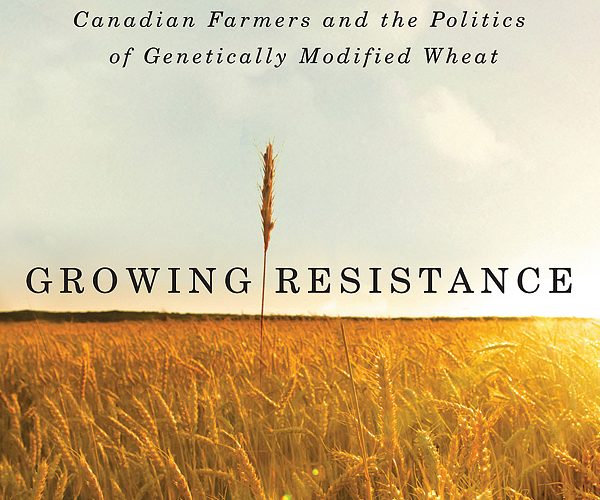A celebration of cooperative action in the face of corporate power and control, Growing Resistance is a must-read for academics engaged in the debate over genetically modified (GM) crops in Canada. Emily Eaton, an assistant professor of geography at the University of Regina, provides a detailed account of the successful resistance to the introduction of GM wheat on the Canadian prairies in the early 2000s, and offers a valuable reminder that issues of farm sovereignty and food security are still present in the Canadian context.
A celebration of cooperative action in the face of corporate power and control, Growing Resistance is a must-read for academics engaged in the debate over genetically modified (GM) crops in Canada. Emily Eaton, an assistant professor of geography at the University of Regina, provides a detailed account of the successful resistance to the introduction of GM wheat on the Canadian prairies in the early 2000s, and offers a valuable reminder that issues of farm sovereignty and food security are still present in the Canadian context.
Growing Resistance centres on the Monsanto Corporation’s 2004 decision to forestall the development of their GM Roundup Ready wheat, and the years of collective resistance that led up to this decision. Prior to the controversy over GM wheat, the Canadian agricultural climate was already grappling with frameworks for simultaneously regulating and promoting GM crops such as corn and canola. Starting in July 2001, a coalition of nine organizations representing a broad range of concerns (farmers, consumers, environmentalists, public health advocates, etc.) spent nearly three years making efforts to publicly oppose the introduction of Roundup Ready wheat.
The coalition held news conferences, produced policy documents, gathered testimonies and contributed to a working group convened by the Canadian Wheat Board. They expressed concern about the environmental risks of growing GM wheat and the lack of transparency in government practices related to it, and argued that introducing the crop would diminish market opportunities for others.
Because Growing Resistance focuses on these perspectives, resistance to neoliberalism and corporate control are key themes of the book. Eaton explores how these ideas were in conflict with the market-based solutions advocated for by GM wheat proponents such as Monsanto, the Canadian Food Inspection Agency, the Canola Council of Canada and Croplife Canada, who defended the impartiality of allowing consumers to choose whether or not to purchase GM wheat.
Growing Resistance is based on Eaton’s doctoral dissertation, and it reads with the precision and intellectual depth of strong academic research, which may dissuade some readers. Certain sections are heavy on academic references and terminology, but readers willing to engage these qualities are likely to appreciate this book’s balance between theory and application. For instance, the concept of consumer choice is cast against insights from “governmentality” literature to help explain the perpetuation of neoliberal practices.
Some readers may also question the applicability of anti-GM struggles from the early 2000s to the current era. Eaton anticipates this concern and offers a warning regarding recent developments in Canada, Australia and the US that hint at a potential resurgence of GM wheat through a synchronized commercialization of the crop. Nine industry organizations (three from each country) released a statement in 2009 regarding their commitment to the ongoing development of GM wheat.
The three countries could simultaneously adopt a GM wheat variety in hopes of pressuring importers to accept it, which would make access to GM-free wheat imports difficult.
Canada may be particularly vulnerable to these renewed efforts due to the recent dissolution of the Canadian Wheat Board. An integral player in the 2001 coalition, the board pushed for a cost-benefit analysis of GM wheat. The 2012 dismantling of the board’s single-desk marketing structure has limited the collective capacity of Western wheat farmers to sell their product and organize themselves to retain control of it in the future.
The historical and cultural significance of wheat is familiar to Canadians, and has been more deeply embedded by the industry’s value to the Canadian economy. Farmers’ resistance to the market-based solutions offered by GM wheat advocates represents a unique experience, but Growing Resistance contains lessons that are applicable to other crops and the global anti-GM movement. Future struggles can learn from the way in which organizations with differing and even opposing points of view can work together and find common ground to protect a shared interest.
Growing Resistance: Canadian Farmers and the Politics of Genetically Modified Wheat, Emily Eaton, Winnipeg: University of Manitoba Press, 2013, 187 pages
This review originally appeared in Night, issue 39.5. Subscribe now to get more reviews in your mailbox!
Reviewer Information
Wesley Tourangeau is a PhD candidate in Social and Ecological Sustainability at uWaterloo. His areas of interest include Canadian agriculture, genetically modified foods, food policy and green criminology.













